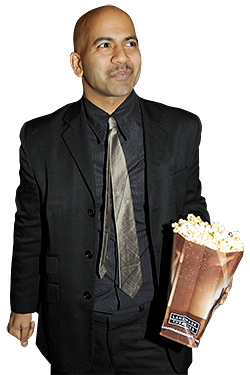
Ajay Naidu is probably still best known for his role as Samir on Office Space, but if you’ve seen the last few episodes of Bored to Death, you may also recognize him as Ted Danson’s poet-chauffeur. It’s not the only place he’s in the driver’s seat — Naidu is now a writer-director. This Friday his debut feature film, Ashes, about a young New Yorker who cares for a mentally ill brother while falling into a life of crime, will premiere at the Mahindra Indo-American Arts Council Film Festival. We asked Naidu what it was like to direct his fiancée, Heather Burns, whether Indian-American stories are now a hot commodity, and whether anyone ever interrupted a shoot with calls of “Samir!”
The namesake character in Ashes cares for a brother with mental illness, played by Faran Tahir of Iron Man and Star Trek. What was the genesis of that story?
It’s a memory poem toward a time when I was younger, and I lost my sister to depressive schizo disorder. At the time, a lot of my friends were dealing, and a lot of my friends were fake Indian gangsters. I tried not to rely on what I knew was the typical gangster formula, so I could tell the story around the real story, which is about a brother’s love, trying to save your family from the onslaught of illness and things like that.
The film was mostly self-funded, with the help of some angel investors. Did you try going the studio route?
The biggest lesson I learned was that nothing will ever democratize filmmaking — it’s a very expensive endeavor no matter what you do. I submitted to a lot of different people, but the difficulty was the subject matter didn’t appeal to the white or black majority, and it really turned off a lot of Indian people — the changes they were asking for just destroyed the story.
Did filming in New York make it even tougher?
Making an indie movie in New York is much easier than anywhere else, because people really like cinema in New York. Once you get the permits, the city really encourages indie filmmaking — the mayor wrote me a letter saying he liked Office Space and wishing me luck.
Does the whole Samir thing make it tough for people to take you seriously as a dramatic actor?
As long as you’re telling the story well, people will suspend their disbelief very quickly if you’re a good actor. Really good comedy is always walking the fine line between laughter and tears, and Office Space is sort of a miserablist comedy.
So people didn’t yell “Samir” while you were filming?
That only happened towards the end of our three-year ordeal with this movie, because Office Space gained momentum in the underground world as the economy collapsed. It really took off once everyone started getting laid off.
What was it like directing your fiancée, Heather Burns?
She teases me really hard and I love it. It’s tough for me because she’s just good — I like to muscle my actors around a little bit and that’s not the way she plays. It’s like driving a Jaguar — she’s very sensitive.
What was it like writing the screenplay with her as well?
She’s a very astute writer. She was always like, “Why? Why? Why?” and sometimes I was like, “Just to be cool! Shit.”
You’ve also appeared on Bored to Death, where she plays Zach Galifianakis’s ex-girlfriend.
Everyone was going to say, “Oh yeah, dude, nepotism,” but they made me audition so many times just so they couldn’t get blamed for that.
Working with Ted Danson and Galifianakis seems like a comic actor’s dream.
It’s sometimes kind of awkward and bizarre — even Zach Galifianakis feels kind of shocked to hang out with Ted Danson, so I’m watching Zach, who’s now like Harrison Ford, freaked out because he’s working with Ted Danson.
You play a chauffeur on the show and you played a taxi driver on 30 Rock.
I’ve played many, many drivers in my life. That’s okay, I don’t mind that. They just have to be dope — they have to be really interesting cats. On 30 Rock, that character was just fun. I just liked yelling at Tina Fey because she’s pretty and recognized me from being a kid. She worked at the local YMCA where I was a camper in Evanston, Illinois, and she recognized me.
But a cabbie is kind of a cliché role for an Indian — have you been asked to do any roles that were just too stereotypical for you?
People ask me to go on things like that, and I’ve wanted to get those parts for the money, but somehow I never ended up getting something that sucks. It’s difficult that that’s my shtick, but Joe Mantegna has a shtick, Paul Sorvino has a shtick — everyone has a shtick. And people don’t see all my other stuff — I just did this little independent heartfelt romantic comedy where I play a Jewish paparazzo.
You just appeared on The Colbert Report as a “random Indian person.” Given shows like Outsourced, are Americans more interested in India?
I think America is overdoing their fake acceptance of the Indian notion right now. No matter what, it’s still a culture-clash joke all the time as opposed to being an integrated, truly relaxed, truly melting-potted version of that.

